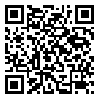BibTeX | RIS | EndNote | Medlars | ProCite | Reference Manager | RefWorks
Send citation to:
URL: http://umj.umsu.ac.ir/article-1-2548-en.html
Background & Aims : Emotion regulation plays a significant role on the emotions and behavior of adolescents. According to the role of attachment and efficacy of coping styles in development of emotion regulation skills, the purpose of this study was to determine the relationship between attachment styles and coping styles with emotion Dysregulation in adolescents.
Materials & Methods : This descriptive study was conducted on 200 students that were selected from 5291 male and female students of second and third grade of high schools in Talesh city . All participants were asked to fill Emotion Dysregulation Scale (DERS), Parents and Peers Adolescent attachment to Inventory (IPPA-R) and Coping Styles Questionnaire (CSQ). The data were analyzed using mean standard deviation, Pearson correlation and step by step regression.
Results : The result of step by step regression analysis revealed that there was a negative and significant relationship between emotional dysregulation with attachment to mother, attachment to father and peers. Also, the relationship of emotional dysregulation was negatively associated with task-oriented coping style but had a positive and significant relationship with Emotion-oriented coping strategies. According of step by step regression analysis, mother and peer attachment and emotion-oriented coping could predict 24 percent of emotional dysregulation variance.
Conclusion : The making attachment to parents and peers and coping styles efficiently are important factors that are involved in emotion dysregulation in adolescences.
SOURCE: URMIA MED J 2014: 25(10): 930 ISSN: 1027-3727
| Rights and permissions | |
 |
This work is licensed under a Creative Commons Attribution-NonCommercial 4.0 International License. |





